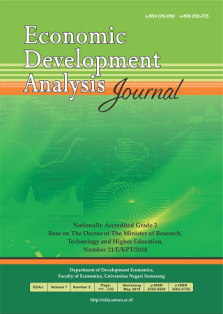Does Neoclassical Theory Exist in SMEs? Evidence from Central Java-Indonesia
Abstract
Financial and non-financial aspects can influence company performance, not excluding small-medium enterprises (SMEs). This research examines the non-financial aspect, since studies in this area are still limited. This research strives to demonstrate the existence of the neoclassical theory in the relationship framework between the business aspect (real sector) and SME performance. This study, which was conducted on batik SMEs in Central Java Province-Indonesia, consisted of 265 samples. The data was obtained from surveys through distributing questionnaires and conducting interviews with batik SME entrepreneurs. The data analysis used a structural equation model (SEM). These study results documented that business prospects have direct and indirect effects on SME performance. The indirect influences are produced through entrepreneurial-oriented financial mediation. This finding reveals that the neoclassical theory will be more effective to improve company performance through entrepreneurial-oriented finance. The importance of the role of this mediating variable is shown from the total effect of the coefficient that is higher than the indirect effect or the direct effect of the coefficient.


